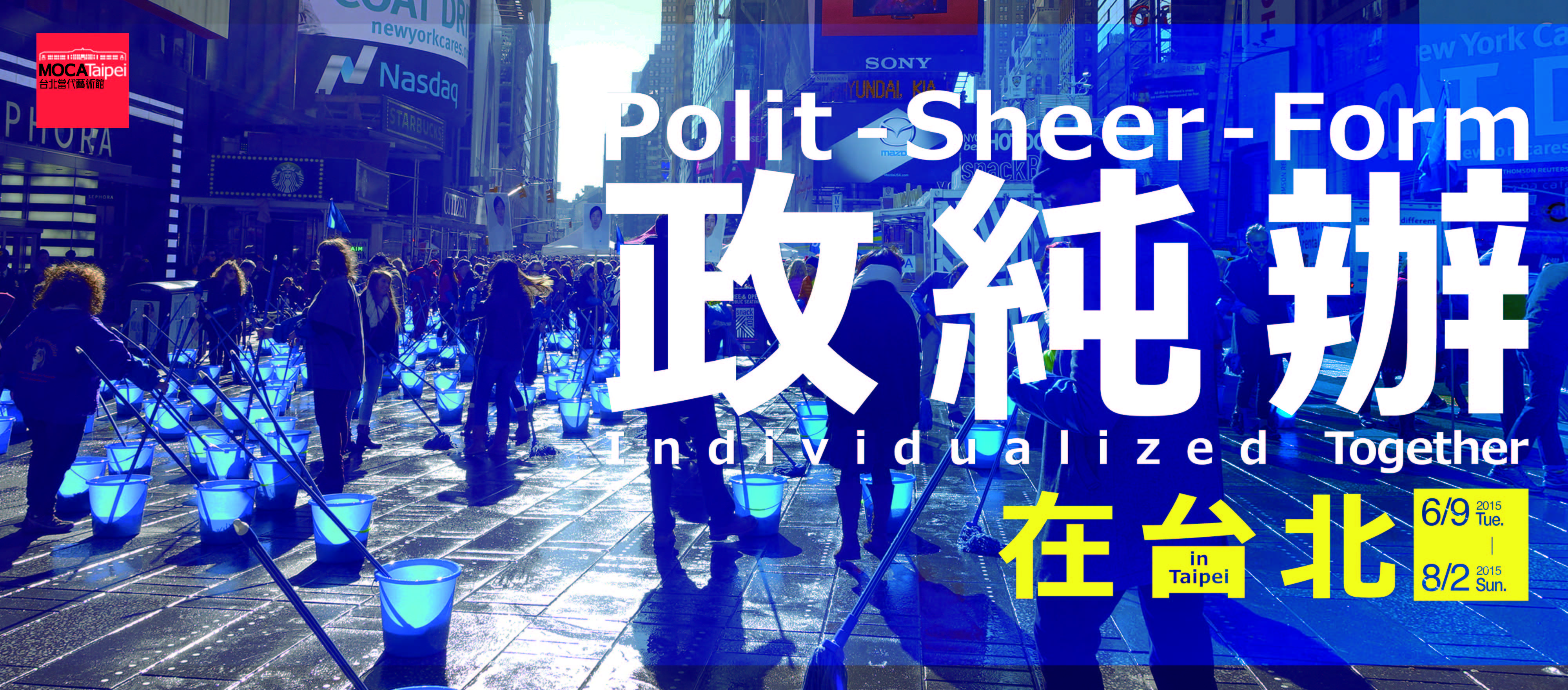

台北當代藝術館 官方網站 Museum of Contemporary Art, Taipei
Friday 星期五
10AM - 6PM



Friday 星期五
10AM - 6PM
EXHIBITIONS & EVENTS 展覽活動

2015 / 06 / 09 Tue.
2015 / 08 / 02 Sun.
「政治純形式辦公室Polit-Sheer-Form Office」 簡稱政純辦 (PSFO),是中國當代藝術家洪浩(Hong Hao)、蕭昱(Xiao Yu)、宋冬(Song Dong)、劉建華(Liu Jianhua)以及藝術評論/策展者冷林(Leng Lin)等五人,於2005年所成立的一個藝術小組,「政純辦」以集體主義的形式概念與創作思維為藝術發聲,陳述世界時潮下,中國社會變異的脈動正不斷加速的現況。
「政純辦」的每位成員,在國際當代藝術領域中,皆各有鮮明的藝術面目和個人風格,並對當代藝術的論述有其獨到鋒利的見解。洪浩 (中國北京,1965-) 以影像語彙結合戲謔、幽默情境,提出對現實生存的質疑與批判;蕭昱 (內蒙古,1965-) 在繪畫、裝置、錄像、聲音等媒材中,探索存在的多義性與人類社會多元的價值觀;宋冬 (中國北京,1966-) 以繪畫、裝置、錄影、行為藝術等手法,呈現常民百姓的人文景觀;劉建華 (中國江西,1962-) 以雕塑和裝置媒材指涉歷史框架下異質共生的文化現象;冷林 (中國北京,1965-) 論述與策展的核心,強調文化自身存在的必要性,除了對當代藝術領域全面涉足,也能基於全球性視野提出精闢的見解。這五位藝術工作者,各自享譽國際藝壇之同時,基於相同的成長背景,對當今中國因高速發展而消逝的人文共性,有著共同的反思,因而合組「政純辦」這個藝術小組,啟動了一波波共同創作和巡迴展示行動。
「政純辦」的五位成員,皆生於「文革」伊始的60年代,經歷過無產階級的集體公社生活;到了80年代,中國正式融入全球經濟體系運作,城市快速發展,資本主義的身影隨著高樓的矗立而漸次取代了共產社區的歷史風貌。之前長達二十年的極端社會主義,轉變至當今隨著世界趨勢而不斷變貌發展,「政純辦」敏銳關照中國現實環境的轉向,從中覺察出人我之間對應關係的巨幅變化--由社會主義集體指向單一目標的緊密性,走向了資本主義私利至上的物質消費和人性疏離!
緣此,「政純辦」以哲學式思辯,提議在既存的集體意識與當下的社會現況之間,以藝術的創意加以關聯--由「我」成為「我們」;隱匿個別的「我」成為「政純辦」;以「一個集體」的擴展與過往的歷史和未來的時間平行對語。五位藝術家一起行動,藉由共同討論、閱讀、吃喝玩樂等活動方式,重新培養一種集體意識和親密無間的概念,由純行為形式體現出精神性內容,傳達「形式」(form) 即「內容」(content) 的創作意涵。做為「政純辦」象徵圖像的「政先生」,即是合成五位成員面部不同特徵,從真實變成虛擬人物肖像;而每次「政純辦」個展,出現於所有作品及展場的顏色「政純藍」(Polit-Sheer-Blue),除了作為這個集體創作展的觀念性基調,也同時寓指了--以「藝術觀念」取代「意識形態」的集體行動,更能海闊天空、無遠弗屆!
「政純辦」基於個人內在的集體需求,在今天由資本釋放的極端個人欲望中,試圖實現一個更充分和全面的個人;透過虛擬的獨立個體身分,在創作實踐中體現對當代的觀察,也寄寓對集體主義的精神渴望。「政純辦」對自身創作抱持了這個理念:「是一種抽掉政治內容和核心的形式;是一種動員,是一種情緒,是一種對實踐無傷害美好的形式;同時也是一種虛擬的實踐…」。
Polit-Sheer-Form Office (PSFO) is an art group established in 2005 by contemporary Chinese artists Hong Hao, Xiao Yu, Song Dong, Liu Jianhua, and the critic/curator Leng Lin. Using the concept of a collective way of life as the backbone of their art, they hope to capture the accelerated social changes happening in China today. Each of the five members of PSFO are known in the international art scene for their unique artistic persona and sharp opinions on contemporary art.
Hong Hao (Beijing, 1965-) criticizes and questions survival and reality with humorous and sarcastic photography. Xiao Yu (Inner Mongolia, 1965-) explores the multivalence of human existence and social values through painting, installation, video and audio art. Song Dong (Beijing, 1966-) uses painting, installation, video, and performance art to represent the lives of the masses. Liu Jianhua (Jiangxi, 1962-) employs sculpture and installation to reveal different cultural phenomena coexisting under a historical framework. The necessity of the existence of culture by itself is at the core of Leng Lin’s (Beijing, 1965-) writings and curated exhibitions; not only is he active in all facets of the contemporary art field, the well-rounded critic/curator is also known for his pointed critiques based on a global perspective.
Although each of the five members has a successful solo career in the global art world, as a group they share a similar background growing up in Communist China and a common concern with how China’s rapid development is stamping out a shared human spirit. These shared life experiences and concerns gave birth to the PSFO art group and resulted in a number of collaborative works and travelling exhibitions.
Born in the 1960s,at the beginning of the Cultural Revolution, all five members of PSFO experienced life in a commune as proletariats. After China entered the global economy in the 1980s, historic communist neighborhoods were gradually replaced by high-rises built under rapid urbanization and capitalism.
After twenty years under extreme communist rule, China is now developing rapidly according to trends in the contemporary world. In their work, PSFO members reflect upon the drastic impact brought forth by this societal transformation on human relationships. They capture how the intimacy between people in a communist society is gradually replaced by a sense of indifference propelled by capitalism, as communal goals are taken over by selfish consumerist desires.
As such, PSFO proposes to bridge the gap between the latent collective ideology with the individualistic social reality through art. Through the expansion of a collective identity, the group converses with the past and the future by replacing “I” with “we,” forming a collective art group by hiding the individual self. To foster a collective identity and sense of intimacy, the five artists brainstorm, read, and play together to communicate the idea that “form” is “content” and express psychological content through pure behavior.
“Mr. Zheng,” the emblem of PSFO, is a composite portrait of a fictional man whose face is a compilation of facial features of the five artists. “Polit-Sheer-Blue,” the signature color that permeates the works and gallery space of every PSFO art show, represents the conceptual basis for the group’s creations and also highlights the pervasiveness of collective projects by replacing ideology with artistic ideas.
PSFO uses a make-believe individualism to represent their observations of contemporary society through art and to express their yearnings for communism. They embrace the following principle in their art: “Polit-sheer-form is a form devoid of political content and core values; it is a kind of mobilization, a kind of mood, and an ideal form that does not harm the practice. At the same time, this practice is fictitious.”
MORE
LESS
CLOSE
ADMISSION 門票
ADMISSION 門票
CLOSE
著作權聲明
台北當代藝術館尊重他人著作權,台北當代藝術館服務條款亦明定,網友使用台北當代藝術館服務不得侵害他人之著作權,因此,台北當代藝術館呼籲使用者同樣尊重他人之著作權。如果您認為台北當代藝術館網站中之任何網頁內容或網友使用台北當代藝術館服務已侵害您的著作權,建議您利用本處理辦法提出檢舉,台北當代藝術館客服中心將儘速為您處理:
若台北當代藝術館網站中之任何網頁內容或網友使用台北當代藝術館服務已侵害您的著作權,請您填寫:「 著作權侵權通知書」,且依該通知書所載提供下列資料及聲明,並以傳真的方式通知台北當代藝術館:
1、著作權人之簽名、或著作權人之代理人之簽名、相關權利證明文件及著作權之內容,例如:已發行書籍之封面及相關頁面、發表於網路中之網頁內容列印紙本及其網址。
2、侵害著作權之內容所在的網頁及網址。
3、您的聯絡地址、電話等資料。
4、書面聲明您確信該網頁內容的使用行為是未經過著作權人、其代理人或法律的授權。
5、書面聲明您於通知書所載相關資料均為真實,且您是著作權人或著作權人之代理人而為上開聲明。
若台北當代藝術館網站中之任何網頁內容或網友使用台北當代藝術館服務已侵害您的著作權,請您填寫:「 著作權侵權通知書」,且依該通知書所載提供下列資料及聲明,並以傳真的方式通知台北當代藝術館:
1、著作權人之簽名、或著作權人之代理人之簽名、相關權利證明文件及著作權之內容,例如:已發行書籍之封面及相關頁面、發表於網路中之網頁內容列印紙本及其網址。
2、侵害著作權之內容所在的網頁及網址。
3、您的聯絡地址、電話等資料。
4、書面聲明您確信該網頁內容的使用行為是未經過著作權人、其代理人或法律的授權。
5、書面聲明您於通知書所載相關資料均為真實,且您是著作權人或著作權人之代理人而為上開聲明。
隱私權保護政策
台北當代藝術館非常重視用戶的隱私權,因此制訂了隱私權保護政策。請你細讀以下有關隱私權保護政策的內容。
隱私權保護政策的適用範圍
1、隱私權保護政策內容,包括台北當代藝術館如何處理在用戶使用網站服務時收集到的身份識別資料,也包括台北當代藝術館如何處理在商業伙伴與台北當代藝術館合作時分享的任何身份識別資料。
2、隱私權保護政策不適用於台北當代藝術館以外的公司,也不適用於非台北當代藝術館所僱用或管理的人員。
3、台北當代藝術館在你註冊台北當代藝術館帳號、使用台北當代藝術館的產品或服務、瀏覽台北當代藝術館網頁、參加宣傳活動或贈獎遊戲時,台北當代藝術館會收集你的個人識別資料。台北當代藝術館也可以從商業夥伴處取得個人資料。
4、當你在台北當代藝術館註冊時,我們會問及你的姓名、電子郵件地址、出生日期、性別、職位、行業及個人興趣等資料。你在台北當代藝術館註冊成功,並登入使用我們的服務後,我們就會認識你。
5、台北當代藝術館也自動接收並紀錄你瀏覽器上的伺服器數值,包括互聯網協定位址 (IP Address) 、台北當代藝術館cookie中的資料及你要求取用的網頁紀錄。
6、台北當代藝術館會使用資料作以下用途:改進為你提供的廣告及網頁內容、完成你對某項產品的要求及通知你特別活動或新產品。
7、台北當代藝術館不會向任何人出售或出借你的個人識別資料。
8、在以下的情況下,台北當代藝術館會向政府機關、其他人士或公司提供你的個人識別資料:與其他人士或公司共用資料前取得你的同意。
9、需要與其他人士或公司共用你的資料,才能夠提供你要求的產品或服務。
10、向代表台北當代藝術館提供服務或產品的公司提供資料,以便向你提供產品或服務 (若我們沒有事先通知你,這些公司均無權使用我們提供的個人資料,作提供產品或服務以外的其他用途)。
11、應遵守法令或政府機關的要求。
12、我們發覺你在網站上的行為違反 台北當代藝術館服務條款或產品、服務的特定使用指南。
13、其他依「個人資料保護法」或政府法令應公開之資料。
14、為了保護使用者個人隱私, 我們無法為您查詢其他使用者的帳號資料,請您見諒!若您有相關法律上問題需查閱他人資料時,請務必向警政單位提出告訴,我們將全力配合警政單位調查並提供所有相關資料,以協助調查及破案!
15、 台北當代藝術館會到你的電腦設定並取用台北當代藝術館cookie。
16、台北當代藝術館容許在我們網頁上擺放廣告的廠商到你的電腦設定並取用cookie。其他公司將根據其自訂的隱私權保護政策,而並非本政策使用其cookie。其他廣告商或公司不能提取台北當代藝術館的cookie。
17、當台北當代藝術館進行與其產品及服務有關的工作時,會使用 web beacons 進入我們的網站網絡,提取cookie使用。
18、台北當代藝術館賦予你在任何時候修改個人台北當代藝術館帳號資料及偏好設定的權力,包括接受台北當代藝術館通知你特別活動或新產品的決定權。